Institutional Context
Summary
The University of Plymouth’s vision is to be a broad-based, research-intensive university, open to all who can benefit from a University of Plymouth education, and delivering excellent interdisciplinary research, experiential education and civic engagement.
The University has a long-standing focus on delivering real-world impact through the translation and application of its research, both globally and locally, and is a three-time winner of the Queen’s Anniversary Prize for Higher and Further Education, most recently for its pioneering research on microplastics and the positive impact of this work on the environment and behaviours. It also has a commitment to supporting the region’s businesses, communities, and enhancing its environment through providing access to world-class facilities, academic expertise and student talent.
Institutional context
Our vision, embedded in our 2030 strategy, is to be a broad-based, research-intensive university, open to all who can benefit from a University of Plymouth education, delivering excellent interdisciplinary research, experiential education and civic engagement. We aim to deliver impact through significant public and business partnerships, for the benefit of society and the economy.
The University has a proud heritage based in its roots as a College of Navigation in the 19th century, and retains a commitment to leverage its global connectivity to deliver local benefits. It is among the largest universities in the South West with more than 18,500 students, 2,500 staff and a turnover of £239 million (2021/22). The University conducts teaching and research across three broad-based Faculties: Arts, Humanities & Business; Health; and Science and Engineering, and is unique amongst modern Universities in having both medical and dental schools.
Our research is renowned for its transformational impact and contribution to sustainability. We are a three-time winner of the Queen’s anniversary prize, most recently in 2019 for marine microplastics pollution research. The impact of our activities on the Sustainable Development Goals is reflected in our ranking of 4th globally for impact on SDG 14: Life below water (Times Higher Education Impact Ratings 2022) and 15th globally for SDG 13: Climate Action.
Our three multi-disciplinary research institutes (Marine Institute, Sustainable Earth Institute and Institute for Health and Care Research) provide a focus for significant contributions to issues of both regional and global concern including development of offshore renewable energy, anti-microbial resistance, and sustainable food production and emerging areas such as maritime cyber-security and e-health.
The University makes a significant contribution to the economic, social and cultural life of the region and beyond, the scale of which was confirmed by an independent impact report (2022), which highlighted the significant role it plays in the city’s economy with around 5,288 full-time equivalent (FTE) jobs dependent on its activities. This is equivalent to 4.7% of all Plymouth employment (2019).
The University’s research and knowledge exchange activities are informed by our partners and our region, which has a number of economic, societal and environmental challenges which the University is committed to addressing, whether that be through supporting innovation in SMEs and addressing the historic low productivity to specific issues where the region provides a test bed with wider national or global relevance. These issues include an ageing and dispersed population, health inequalities or an agricultural economy dominated by small scale producers, issues which also provide opportunities to collaborate with external partners to develop solutions with wider application.
The breadth of the University’s KE activities ranges from a vibrant public arts programme to focused collaborative R&D projects, and the commercialisation of research through establishing Spin Out companies. We are also actively developing our models of student knowledge exchange and student enterprise. Common to these diverse approaches, which are firmly embedded in our research excellence, is a commitment to delivering demonstrable impact, not least to our region and its communities.
For further information, please send queries to Adrian.dawson@plymouth.ac.uk
Local Growth and Regeneration
Summary of approach
As one of the largest universities in the South West, the University of Plymouth is a key strategic partner in the city and the wider region and has significant economic impact. It supports the development and delivery of local economic strategies and works in partnership to support both key sectors and wider innovation across the broader business community, enabling access to its world-class facilities and stimulating collaboration between researchers and enterprise.
The University’s support for local industries and communities reflects its cultural and historic roots as a School of Navigation, whilst also drawing on and leveraging its current global leadership in key research areas, not least in marine science and engineering, and sustainability.
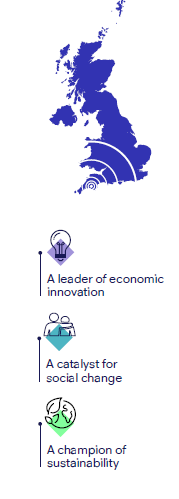
Aspect 1: Strategy
The University’s Strategy 2030, “a Future of Excellence”, has a central objective to “Achieve influence and impact through significant industry and business partnerships”, optimising research impact and knowledge exchange to the benefit of society and the economy by driving global connectivity that makes a difference. Although international in our outlook, and reputation, our “place” for local growth and regeneration is defined by the physical and economic geography of the South West Peninsula. With marine, environmental sustainability, and health research and innovation being particularly influenced by our maritime and peripheral location.
While our international student population is increasing significantly, we draw the majority of our students from the South West and are committed to our role as key partners in economic development, looking outwards and collaborating globally, but leveraging the benefits of these connections for the businesses, communities and environment of the region.
The following schematic clearly demonstrates how our Civic commitment to local growth and regeneration flows through our core strategies.
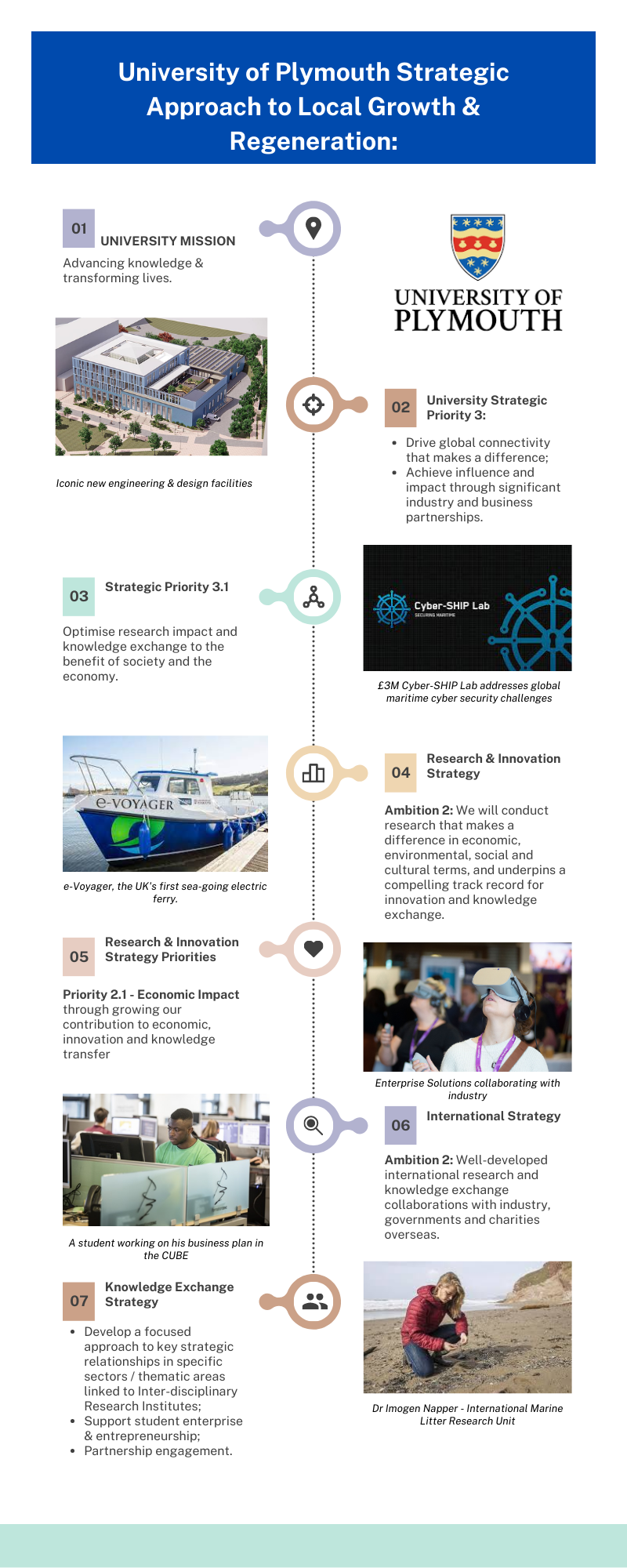
As a predominantly rural region, the importance of sustainable food production and land management is a key research area for our Sustainable Earth Institute
The University is also a key player in Plymouth’s cultural development, working proactively in partnership with other cultural organisations to support the city’s development as an artistic and cultural centre, including as a partner in the development of The Box. It is proactive in promoting city arts and culture, hosting the largest contemporary art gallery in Plymouth and a wide-ranging public arts programme.
Aspect 2: Activity
Our mission of advancing knowledge and transforming lives, and our strategic intent to deliver a positive impact from our activities, informed by our engagement in regional strategy and policy making, is reflected through key initiatives which are outlined in our HEIF Accountability Statement, and which provides the framework for targeted HEIF investment to:
Support key growth sectors aligned with local strategy and linked to our inter-disciplinary research, and
Drive innovation in our local SME community
Through our three Interdisciplinary Strategic Research Institutes, we focus our support for key regional growth sectors on the following three clusters:
Marine & Maritime: A key strategic focus in the region is the growth and development of marine science and engineering including offshore renewable energy, marine autonomous systems, and maritime cyber security. In support of this, over 2019-2022 the University:
Developed the Ocean Futures programme to create a blueprint for the region’s future blue economy and identify its key strengths in fields including marine autonomy, digital innovation and the development of clean maritime technologies.
Developed a £1.2m Smart Sound Plymouth project to create a proving ground for businesses to develop advanced marine technologies across all domains; above, on and below the water.
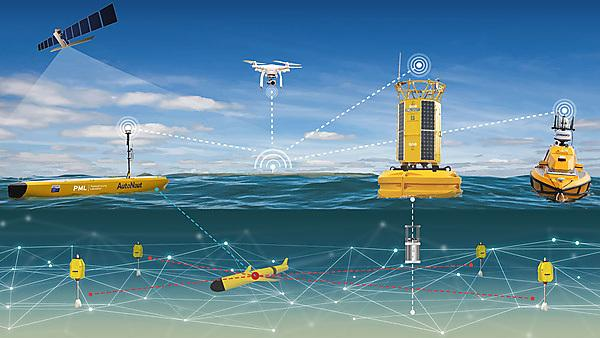
Co-ordinated through the Marine Business Technology Centre, Smart Sound Plymouth is a partnership between five organisations boasting considerable expertise in autonomous systems.
Was a partner in the Marine Autonomy Assurance Test Bed initiative and have played leading roles in two successful Freeport bids (Plymouth & South Devon and Thames) and the securing of funding for the Plymouth Sound National Marine Park.
Provided commercial access to world-class test facilities in its Coastal Ocean and Sediment Transport Laboratory (COASTLab), offering advanced capability for commercial testing of offshore wind, wave and tidal Marine Renewable Energy devices,
Was a partner in the Marine Business Technology Centre, within the Oceansgate Enterprise Zone, offering in-depth product testing and development of marine-related technologies, supported by the University’s researchers and facilities
Secured £3m Research England funding for a Cyber-SHIP Lab which addresses a number of the complex and interlinked cyber-security issues that affect the maritime industry.
Delivered £15m of regional RD&I funding via Marine-I to 200 regional SME businesses including £4.3m of grant funding helping to create 40 major new products and services.
Used its Maritime Simulation Laboratory to train technicians to create new vessels that appear realistic and exhibit accurate hydrodynamic and aerodynamic functionality.
Health Technology and Innovation
Reflecting the challenges and opportunities around healthcare outlined in regional strategies, the University:
Formally opened the Brain Research & Imaging Centre (BRIC) in 2021-22, heralding a transformation in the level of neurological work academics can undertake. BRIC consists of seven cutting-edge human neuroimaging research laboratories to help better understand brain activity and human behaviour.
Has established the Centre for Health Technology bringing together digital health and technology expertise to drive the development, evaluation and implementation of innovative technologies, products, services and approaches. Focusing on digitally-enabled innovations, our researchers work with a network of cross-sector partners, to deliver research and development of international importance, enabled by the unique population and geographical characteristics of the region.
Has established the Plymouth Health Innovation Alliance, to complement the Health Innovation Campus within which 60% of the city’s healthcare provision is delivered supporting over 6,000 jobs with another 1,000 in the supply chain. Centred around Plymouth Science Park and the largest hospital in the South West, it brings together the NHS Trust, the University’s Derriford Research Facility, Peninsula Schools of Medicine and Dentistry, Peninsula Clinical Trials Unit and Plymouth Allied Health Care, with 27 medical companies based at the Science Park, building a vibrant cluster of real significance for the regional economy.
Led the eHealth Productivity and Innovation in Cornwall project (EPIC) – a £4m collaboration seeking to help grow eHealth businesses and improve health, wellbeing and enhance care quality across a highly dispersed population.
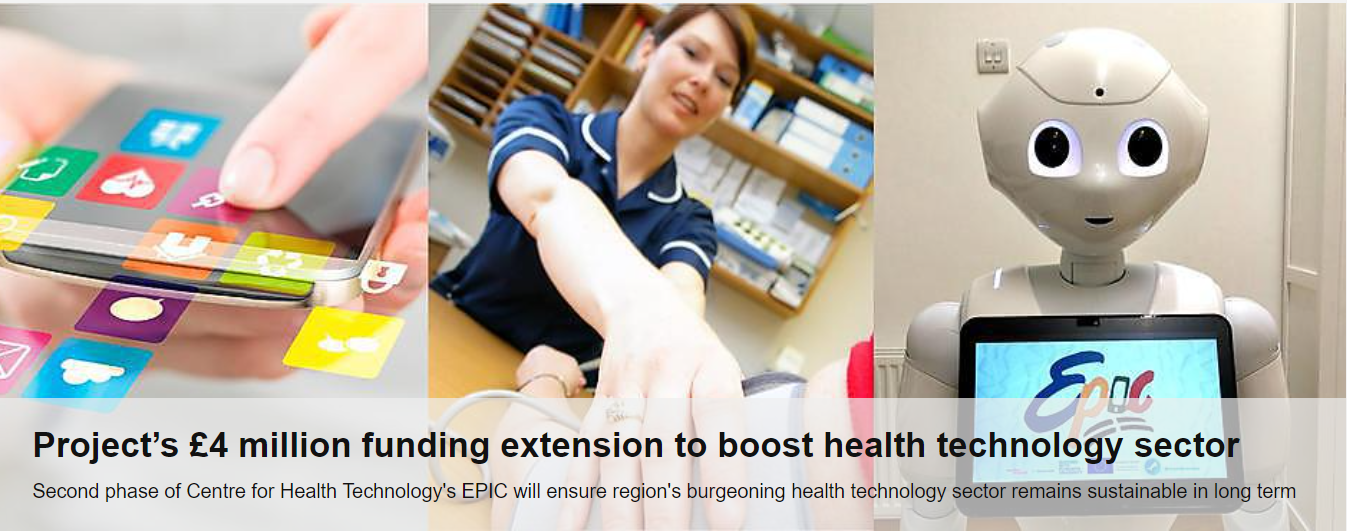
Sustainability & Climate Action
The nature of the region means that it faces a range of environmental sustainability challenges that echo national and global concerns. This provides opportunities to focus University research on local challenges that also have global relevance, led by the multi-disciplinary Sustainable Earth Institute. Over the past three years this has included:
Devon Agri-Tech Accelerator Project (DATA). Responding to developing national agendas, DATA supports agri-tech businesses with their innovations and creates a community of agri-tech businesses and farms, helping to reduce Devon’s carbon footprint, enhance farm productivity, keep a localised economy, and grow the agri-tech business sector.
ReCon Soil, which aims to significantly reduce the amounts being paid by the industry to dispose of waste soil from building sites – while contributing to food security, agricultural sustainability and reduced carbon emissions.
Low Carbon Devon. Three-year £2.6m programme to support Devon-based organisations to access research, business support, and engage with the University of Plymouth around the low-carbon agenda.
Establishment of the ELMs Exchange, which aims to support the region during a time of radical change in agricultural and land management decision making, aiming to promote sustainable farming practices that support the recovery of local nature and improve food production. The ELMs Exchange connects university researchers to emerging environmental land management agendas and with agricultural sector partners, assisting them to deliver evidence aligned to evolving policy instruments.
Plymouth’s Marine e-Charging Living Lab (MeLL), the UK’s first e-marine hub of shore-side charging facilities for electric maritime vessels.
In addition to this targeted cluster focused approach, the University also seeks to drive innovation across our wider SME community. The University has always taken its role seriously in supporting the creation and growth of the micro-enterprises and SMEs that characterise the local economy. SME engagement is coordinated by the business-facing Enterprise Solutions Service which helps businesses to access university support to overcome their barriers to growth, and which generates over 100 university and industry joint research collaborations every year. These range from student projects and internships to providing access to world-class facilities such as the Plymouth Electron Microscopy Centre to the development of successful Knowledge Transfer Partnerships. Launched in 2020, the University has strategically invested HEIF in establishing the R&D Solutions Fund that provides pump priming awards to deepen collaborations between academics and external organisations. To date, this has identified over 120 collaborations and supported 18 projects across our 3 Faculties with research collaborations in areas of biomedical science, environmental sustainability, engineering, biological and marine science and health & psychology.
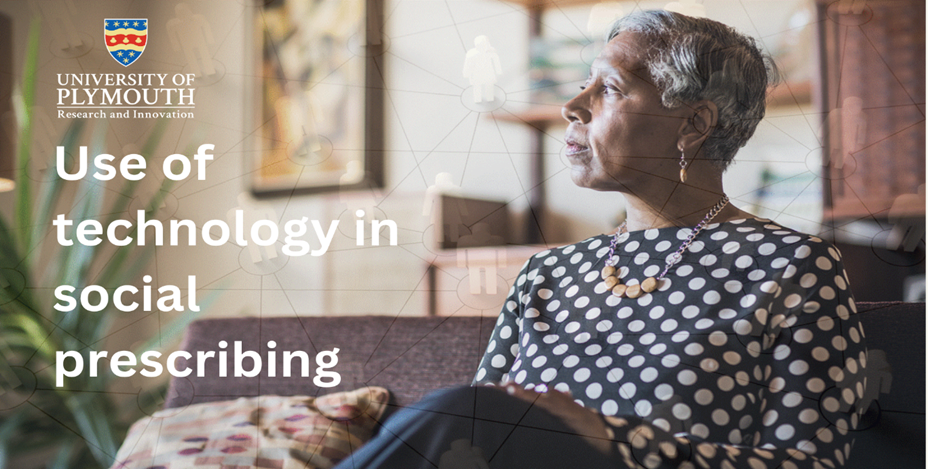
Enterprise Solutions provided a £20,000 grant from R&D Solutions Fund to support an evaluation of health technology innovations for our region’s ageing population.
The University operates three Innovation Centres in Cornwall, home to 140 high growth enterprises creating high quality jobs in a region typified by low wages and low productivity, and the Brixham Laboratory which hosts a cluster of high-tech marine related businesses. In addition, its £3.4m Acceleration through Innovation project has provided high value and intensive innovation support to SMEs both from within these Centres and across the wider region.
We continuously review our priorities and how they align with the needs of our region. Our approach includes:
Sitting on external boards, expert groups, and committees such as The Growth Board, the Heart of the South-West LEP, Devon and Plymouth Chamber of Commerce etc.
Working closely with partners on strategies and new developments such as Freeport, Ocean Futures and The Great South West regional partnership.
External evaluations and research – to understand the impact of our approach and build in continuous improvement.
Aspect 3: Results
We understand the impact of our activities through:
A regularly commissioned impact study
External research, evaluation and modelling
Internal project level monitoring and evaluation
Stakeholder feedback
Focusing on outcome based KPIs
The University’s Economic and Social Impact Report (2021) report found that across the South West region, the University’s activities generated £772m of output, which consisted of £492m through direct and secondary efforts, and £280m from student expenditure. The University generated 9,018 jobs in total, 0.3% of South West employment, 0.32% of regional GVA and 5% of city GVA. This report has been shared with key partners in hard copy and is available on our website, it has also formed the basis of local and regional presentations.
The University identified a number of key outcome based KPIs in our HEIF strategy and in the KEF period delivered the following:
Over 2,400 businesses supported to develop new products, services or processes (through research collaborations, consultancy support, exploitation of IP, access to facilities etc.) derived from a total of 3,230 initial engagements with businesses.
Over 200 new student start-ups, with a further 152 established businesses sustained.
Positive influence on regional partnerships / initiatives through strategic engagement including the development of a National Marine Park, developing a Degree Apprenticeship portfolio to address low levels of participation in HE via a city-wide Skills strategy, aiding the development of two Freeports and Build Back Better post-Covid economic regeneration.
Our infrastructure investment also generates significant economic benefit for the region and one of the key aims of our Estate Masterplan is to create an inspiring, progressive and sustainable environment in the heart of the city and contribute to its regeneration. This includes the redevelopment of the derelict Inter-City House building at the city’s railway station, to be our new home for allied health professions and which is part of a much larger urban regeneration programme. The six-year capital investment programme, in the heart of the city, is forecast to total £246m and generate almost 5,800 jobs by 2026.
We use the findings from external evaluations to help us understand our impact, share learning with others and help shape future priorities. For example, the evaluation of our Acceleration Through Innovation Programme (ERDF funded £3.4m) highlighted the impact of linking innovation ready businesses in Cornwall into University expertise. 94% of businesses stated that the programme had a positive or significant impact on their innovation and growth, while 84% identified that it had helped future proof the business and made it more resilient.
We supplement external evaluations with a programme of internal evaluations, drawing upon the HEIF Logic model (SQW 2020) but adapted to suit our own KE priorities and 2030 Strategy. The Logic model is a starting point for all KE monitoring and evaluation. It allows staff to clearly see potential impacts and outcomes and plan evaluations accordingly. The evaluation of the R&D Solutions Fund highlighted that for an initial investment of £312,000 into collaborations, £1.4m of additional research funding has been secured so far and further research collaborations are being developed which we will continue to monitor for impact.
Externally we share lessons learned with the city and region via networks, specialist groups, awards and webinars. We encourage our staff to sit on regional policy groups and to work in partnership with a wide range of organisations. We also organise and host an annual civic event where we share our regional activity and impact with a wide range of stakeholders and encourage feedback and joint planning. Outside of these formal networks, we work closely with our marketing and communications team to ensure partners are kept informed via press releases, sharing of reports, web pages and social media.
Public & Community Engagement
Summary of approach
Public, community and civic engagement have always been at the heart of the University of Plymouth’s approach to impactful research and knowledge exchange. Our long-standing commitment to delivering meaningful public engagement that demonstrably benefits our people and our place is underpinned by an institutional strategy, with a mission to enhance knowledge and transform lives. Our communities and partners inform a broad range of public engagement activities delivered by our academics, and are clearly aligned with the University’s research strengths. These activities include participatory research, community outreach and free access to cultural activities, coordinated and enabled by a dedicated central resource, which also supports a culture of continuous improvement in our approaches to public engagement through robust monitoring and evaluation.
Aspect 1: Strategy
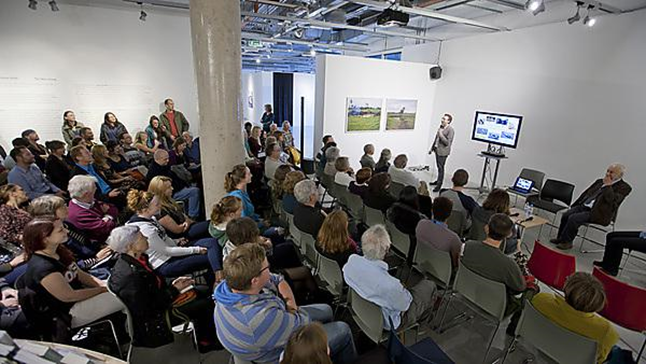
Figure 1:Panel discussion at the Roland Levinsky Gallery
The University published its Public Engagement Strategic Plan in 2022 with a mission to ensure:
‘Our research is inclusive, impactful and enriches the lives of those who are involved in it’
The Strategic Plan sets out our institutional objectives to ensure public and community engagement (P&CE) delivers both meaningful impact for our communities and partners, but is also grounded in an academic recognition that our research is of a higher quality and more impactful through an engaged approach. The plan complements the University of Plymouth’s history of place-based civic engagement and engaged research and has five key aims (Fig 1).
These institutional objectives provide the framework for local initiatives embedded in our Faculties, as well as centrally led, cross Faculty, initiatives, delivered by the Public Engagement team, which sits in the Research and Innovation Directorate, or by our inter-disciplinary Strategic Research Institutes.
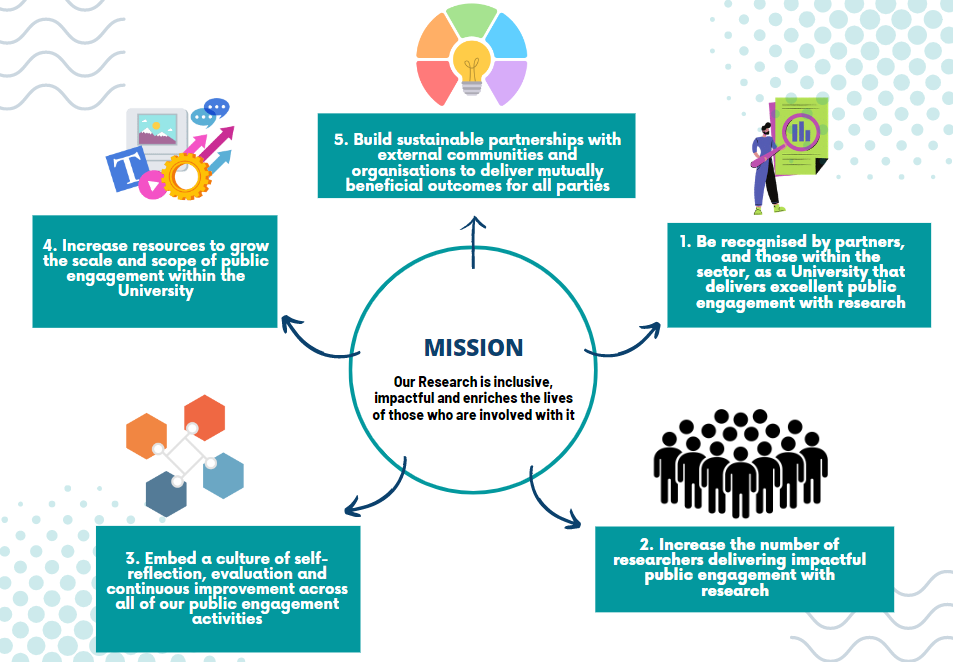
Figure 2: PE strategic plan
P&CE is also embedded across all key strategic documents, including the University’s overarching 2030 Strategy and the Research and Innovation Strategy.
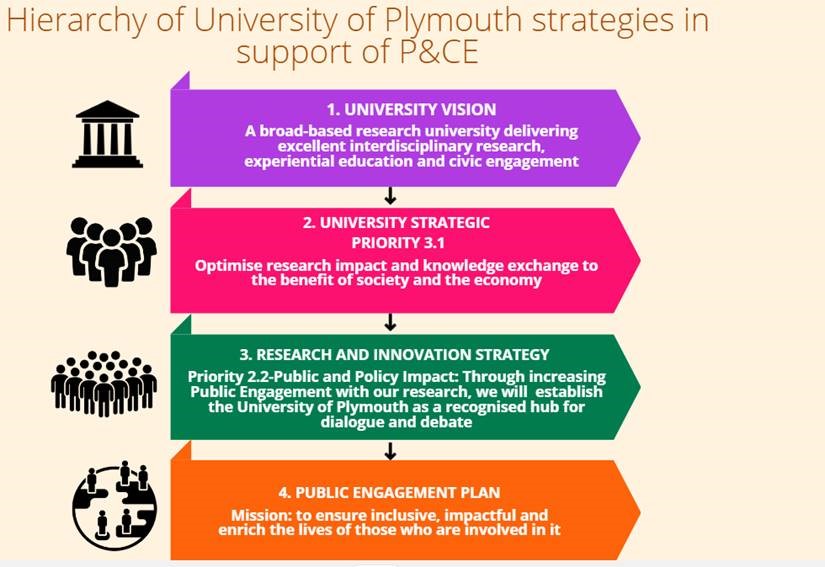
Figure 3: P&CE strategic "golden thread"
The breadth and depth of our P&CE activities is extensive, from working with very small grassroots organisations to multinational charities, and from engagement that shapes and informs our research, to working with community groups to effect positive change in our city. In developing and shaping these activities we continually engage our community and publics, including through an extensive consultation exercise in 2020 that informed the development of our Civic University Agreement. Public engagement activities are resourced through a strategic HEIF allocation (as outlined in the HEIF Accountability Statement) as well as external project funding and ringfenced QR allocations (such as the Participatory Research Fund). Individual academic staff time is committed from their research workload allocation. To ensure that these resources are strategically aligned a logic model has been developed (Fig 4) based on the SQW HEIF model.
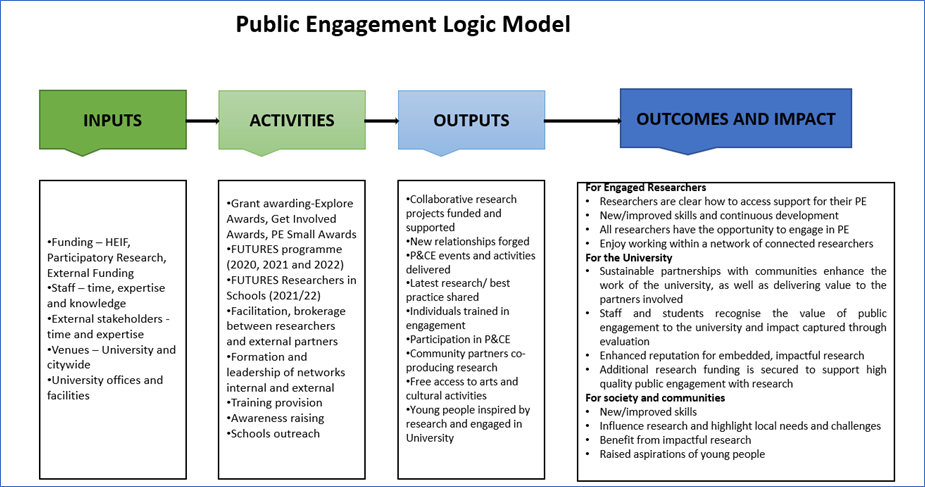
Figure 4: PE Logic Model
P&CE is further enhanced through our student input, with community-based activity and external engagement embedded into many degree courses to create pioneering experiential learning models.
Overall strategic oversight of P&CE sits with the Deputy Vice-Chancellor (Research and Innovation) as Chair of the University Research and Innovation Committee. Sitting below this is a Public Engagement Champions Group with delivery supported by peer support groups facilitated by the Public Engagement Team.
We also strive to ensure that the University’s commitments to equality, diversity and inclusion are fully reflected in our P&CE, both in terms of ensuring equality of opportunity for staff and students to benefit from activities and also in supporting vulnerable groups and communities. Please see Aspect 2 for further details.
Aspect 2: Support

One of the main benefits of the establishment of a dedicated team is the provision of specialist support to researchers in developing their engagement approaches and fostering a culture of excellent engagement practice across the University through advice and guidance, networks and peer support, alongside a programme of small grant awards. We foster excellence through:
Public Engagement Champions (see governance in Aspect 1) who are recognised as undertaking excellent P&CE. The Champions use their experience to share and disseminate best practice across the University
Peer learning networks which have been successful on our small grant programmes in creating connections between researchers enabling shared learning and support
Explore Awards that provide grants of up to £6,000 to support Early Career Researchers to undertake public engagement with research
Researcher Development Programmes for Engagement and Impact
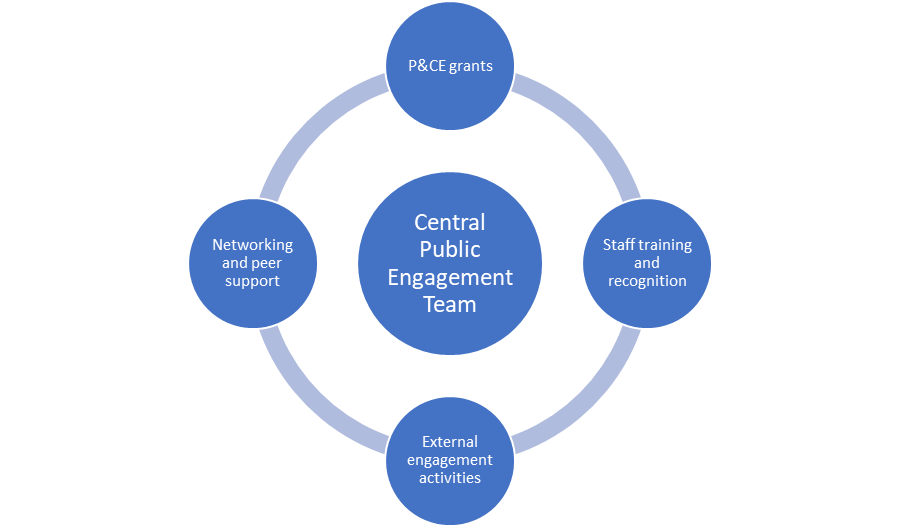
Figure 6: PE&C Support
A further pillar of our strategic approach to P&CE is its reflection in academic promotion criteria and academic development. For academics on the balanced pathway a “significant track record of effective and innovative public engagement in research” is now in the promotion criteria. P&CE is also part of annual performance reviews and included in Research Leadership training and Research Mentoring. The annual Vice-Chancellor’s Awards also includes a category for staff who have demonstrated a positive impact on economic and societal outcomes through civic and public engagement.
In delivery of our P&CE activities we apply the principles in the NCCPE guide on EDI for public engagement. In particular we are cognisant of the need to avoid ‘drive by engagement’ and our approach has always been to prioritise deep rooted, long-term partnerships that deliver genuine and demonstrable positive impact in communities, such as the Law Clinic. We are also aware of the need to minimise the burden of engagement on small voluntary organisations and ensure that we pay organisations who support our work through sitting on grant panels etc. As a matter of course we consider venues, language, and messaging to ensure they are inclusive and are aware of the potential complexity of some of the issues on which we engage communities.
A number of our PE initiatives have a specific purpose around inclusion, whether that be delivering dental or legal services to vulnerable marginalised communities, or programmes around promoting women scientists and their research (part of the Soapbox Science programme) or the Girls into Geoscience programme – an outreach activity that encourages girls into geoscience.
A key measure of the success of our scaled up investment in public engagement capacity and resources is the number of researchers who seek advice and support, and in particular the number who have applied for an internal grant to support their public engagement activities. In the first year of these grant programmes (2021-22) 48 researchers applied for funding, while in 2022-23 this had risen to 81. This clearly demonstrates both increased appetite and increased awareness of the support available.
Aspect 3: Activity
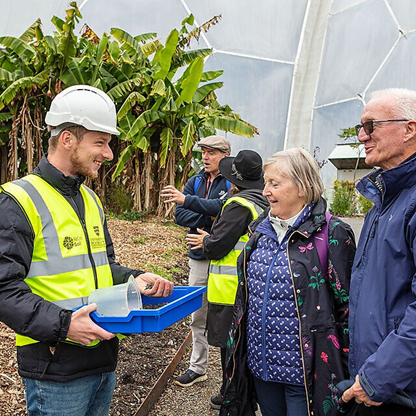
Figure 7: Soil scientist engaging the public at The Eden Project
Building upon many years’ of innovative and impactful P&CE practice we have developed a broad P&CE programme ranging from wide reaching podcasts and free access to cultural activities to participatory, community engaged and informed research. The programme includes the following elements:
The Public Research Programme – connecting publics to our research through public lectures, an annual Research Festival and a series of history themed podcasts that supported home learning during the pandemic.
Get Involved Awards – Supporting communities to co-design projects with our researchers to find solutions to community problems. During this process, community partners are made associate members of the University of Plymouth with access to our resources and services to develop their research skills. We also provide community researcher training for our community partners.
Explore Awards – Small grants to facilitate partnership development between Early Career Researchers and community groups and organisations that are built upon mutual benefit, with shared goals and interests.
A number of “Deep Impact”, nationally recognised initiatives in some of our most vulnerable communities. For example, both the Plymouth Law Clinic (https://youtu.be/POpjQDTWV-U) and the Peninsula Dental Social Enterprise (PDSE) have won national awards during the KEF period in recognition of their community impact, while our optometry practitioners and students deliver eye-care clinics across the city.
The FUTURES Programme - targeting some of the most disadvantaged areas in our region, FUTURES is an annual public engagement festival (funded through H2020) dedicated to showcasing research and innovation The University has delivered over 15 FUTURES events,
attracting more than 1,000 participants.
An example of the FUTURES 2021 Programme illustrates the range of P&CE activities undertaken. The remit of FUTURES continues to evolve, with the University of Plymouth now leading a regional programme of Researchers in Schools, a schools engagement work package.Public Arts programme with free and accessible annual events such as the Ignite Festival as well as an on-going programme of film, exhibitions, dance and music.
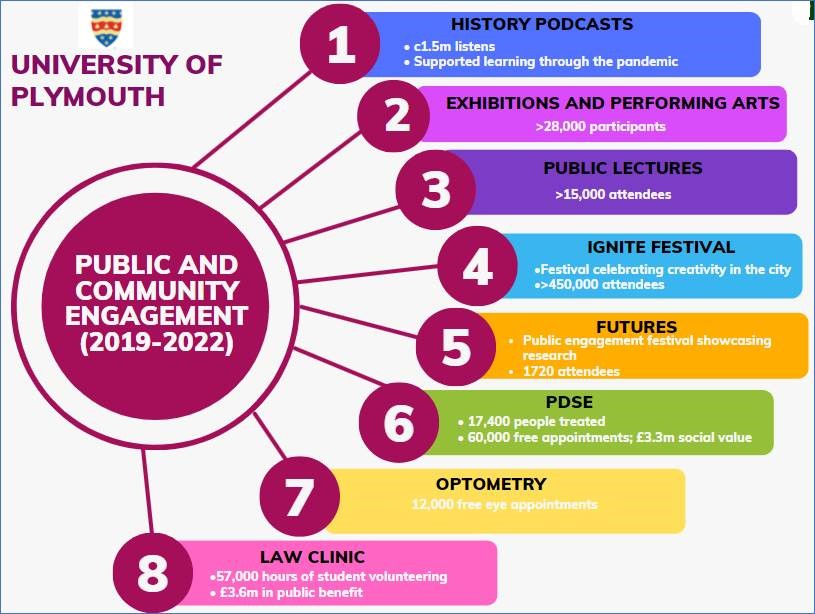
Figure 10: From breadth to depth - P&CE activities during the KEF period
Aspect 4: Enhancing practice
The University of Plymouth takes a proactive approach to the evaluation of P&CE, focusing on continuous improvement and self-reflection to ensure our work continues to develop. As shown in Aspect 1 (figure 4) we have developed a logic model, which helps support design, planning, communication, evaluation, and learning. Drawing upon the HEIF Logic model (SQW 2020) but adapted to suit our KE priorities and 2030 Strategy, the logic model is a starting point for all KE monitoring and evaluation. It allows all staff to clearly see potential impacts and outcomes and suggests measures for self-evaluation including benchmarking. Our principles for evaluation of PE are:
Only collecting data that is needed, useful and reliable
Engaging participants in the approach of data collection
Providing training to all participants
Feeding back to participants on findings
Ensuring it feeds into self-reflection for the PE team
Public engagement features in several of the University’s KPIs, including within the Research and Innovation Strategy, which includes an aim to “Support meaningful public engagement with our research”. Within our public engagement strategic plan there are three high level KPIs, which are:
Receive a Silver Watermark by the National Coordinating Centre for Public Engagement
To grow membership of the University’s Public Engagement Network by at least 10% annually
To be in the top quartile for PE in KEF by 23/24
Within the Research and Innovation Directorate, we have a specialist evaluation research unit, SERIO, who provide support with the evaluation of public engagement. SERIO staff have also developed a model of researcher training for community members to help underpin research co-creation within our Get Involved Awards. Funding for their evaluation work has come from external sources (FUTURES and Office for Students) as well as from University core funding.
We use the annual Higher Education Business and Community Interaction Survey (HEBCIS) PE return to connect with a wide range of researchers and our Events Team. By collecting accurate and robust data we can understand who engages and where we might need to focus, both in terms of geography and demographics.
Within our PE activity, we actively encourage the use of evaluation and reflection. For example, within the Explore Awards, our researchers are brought together at the start and end of their award to reflect, share practice and take part in evaluation. They also submit an end of evaluation report after the award ends, and we continue to monitor outcomes following their funding period. With both our Explore and Get Involved Awards, we use a cohort model for each funding round, bringing together successful applicants to share knowledge, provide peer support and to reflect on their own practice.
Through commissioning an external public engagement consultant, we have been able to support the University’s three Strategic Research Institutes (SRIs) to reflect on their current approach to P&CE. The approach included stakeholder interviews, document reviews, analysis of strategies and group discussions. A summary of findings, recommendations and SWOT analysis were produced, which can be used by the SRIs to shape their future approach to embedding P&CE in their research culture.
Reflecting the foundations that we have laid for evaluating P&CE activities, we will commit to using the NCCPE’s EDGE tool in an annual review of our progress and will create a range of resources to support academic staff to embed evaluation within their our approached to P&CE.
Aspect 5: Building on success
Over the past three years, the University of Plymouth has substantially developed its support for P&CE and embedded evaluation and a cycle of continuous improvement within it. We have drawn upon a simplified version of the ROAMEF model (The HM Treasury Magenta Book 2020), the key purpose of this is to build a culture of continuous learning.
Initially working with an external public engagement consultant, we reviewed our strategic approach to public engagement and used the recommendations and discussions to inform our strategy. Following this review, and in developing our strategic plan, we undertook a period of consultation with internal staff, external partners and communities. This engagement, and working with the Public Engagement Champions, enabled us to identify key priorities and actions.
Moving forward, and as shown in Aspect 1, we have established a governance model that feeds into both our strategic and operational activities. The core public engagement team in Research and Innovation drives the majority of the central P&CE delivery, working with colleagues across the faculties to embed P&CE within research. We regularly share progress reports with senior management teams, as well as through involvement in faculty committees and informally via updates with colleagues. Monthly reviews have progress against our strategic plan, our KPIs and evaluation and as a standing item.
In 2021 we enhanced our digital presence through the creation of a number of public engagement webpages, which raise the visibility of our strategic plan, internal and external funding calls, and overviews of funded collaborations. As we grow our programme, the website will develop to reflect this.
We are committed to involving communities in our processes. For example, with our Get Involved Awards, we have community representation on our funding assessment panel and ensure we gather feedback on their experience of the partnership and award. We also provided training, run by SERIO our research and evaluation unit, on being a community researcher to support engagement.
We actively respond to feedback and evaluation to refine and enhance our approach. This has included:
Changing the timelines of The Get Involved Awards to allow more time for co-creation proposal development and ethics approval.
Maintaining a hybrid programme to ensure inclusion of those living in rural areas or unable to physically engage
Providing research training for community groups to enable full engagement with research
Working with other public engagement professionals across the city to build capacity and joint working
Building in financial payments for students undertaking public engagement
Note You are currently viewing the latest version of this narrative statement. View the previous version as published in previous iterations of the KEF (KEF1 and KEF2)